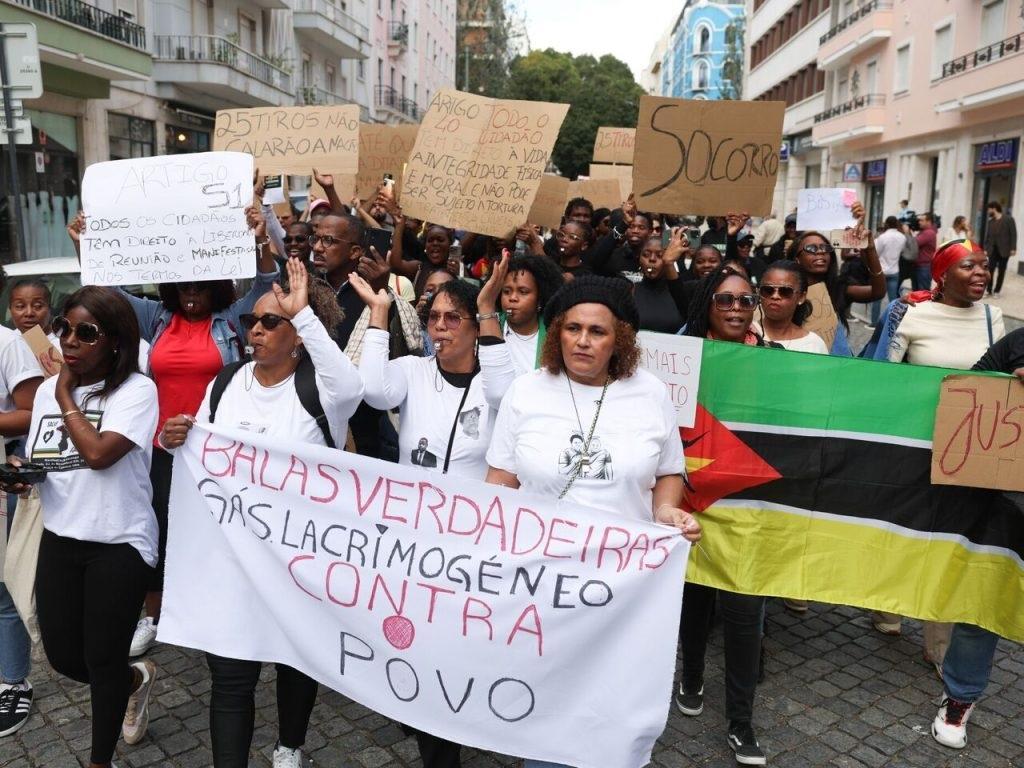Africa-Press – Mozambique. Around two hundred people took part in a march in Lisbon at the weekend, to protest against the violence in Mozambique and the authorities’ handling of the general election there – even as demonstration continued in the country itself.
Saturday’s march began near Mozambique’s embassy in Portugal, where more than 120 people gathered to call for “the people in power” before ending at Praça do Comércio.
Chanting slogans and holding placards, after singing the Mozambique national anthem, the demonstrators marched downtown.
Once in the riverside area, the demonstrators once again chanted the anthem “Beloved Homeland” – repeating the line “no tyrant will enslave us” several times.
Brandishing placards calling for “help” and “justice” and pointing out that “those who fall asleep in democracy wake up in dictatorship” they also criticised the country’s president-elect, Daniel Chapo, who was supported in the recent campaign by the governing Frelimo party, which has in power since 1975.
On 24 October, Mozambique’s National Electoral Commission (CNE) announced the victory of Daniel Chapo with 70.67% of the votes in the 9 October elections to choose the head of state.
Venâncio Mondlane, supported by the non-parliamentary Optimist Party for the Development of Mozambique (Podemos), was deemed to have come second with 20.32% of the vote; he has contested the results, which have yet to be validated and proclaimed by the Constitutional Council.
Mondlane was supported by several of the marchers in Lisbon.
Speaking to Lusa, one of the organisers of the protest, Ernesto Damião, who has been in Portugal for three years, said that “the people have reached a limit and are calling a halt.
“What brought us here to protest was: firstly, to show solidarity with our people and, secondly, to show the international community and the Portuguese people… the real situation that is happening in our country, and we would like these organisations to pay attention to what is happening,” he said.
Damião deplored what he said was a situation in which “many freedoms” are being limited in Mozambique, criticising the way Frelimo has run the country since independence.
The demonstration was called by a project called Quid Iuris, created by young Mozambicans.
Gilana Sousa, one of its members, hailed the turnout for the march, which she said included “more people than expected”.
Asked what motivated the demonstration, Sousa explained that it was mainly “the constant murders that have been taking place” in Mozambique but also “the extreme police violence” there.
“We, for example, were able to demonstrate,” she pointed out of Portugal. “It’s a right that is enshrined in the Constitution of the Republic of Mozambique, but at the moment, if our brothers want to demonstrate, they may well not return home alive.”
Sousa suggested that tensions in Mozambique have intensified after the October elections: “The people wanted change and when they didn’t get that change, they revolted, but it seems that the revolt is not being well received.”
One of the aims of the demonstration, according to both Sousa and Damião, is to mobilise the Portuguese authorities for dialogue with Mozambique.
“Portugal and Mozambique have very strong external relations,” said Sousa, arguing that Portugal should “put itself in a position and say what it thinks of this situation” as well as mediating a dialogue.
Also speaking to Lusa, Mondlane supporter Joana Gemo said that there has been a lack of real opposition in Mozambique, which, in her opinion, “has always been a country with problems” despite some development.
“Today there is an opposition to match,” she said, referring to the candidate supported by Podemos. “He has managed to make us realise that we have power.
“We think it’s time to fight to end tyranny in Mozambique,” she went on. “It’s been fifty years of suffering, fifty years of murders.”
Gemo, who has been in Portugal for 17 years, said that although she feels welcome in the European country, she wants to return to Mozambique, but still considers it unsafe territory.
For the third day running, the city of Maputo on Saturday saw clashes between supporters of Mondlane and the police, who used tear gas to disperse the demonstrators.
Also for the third day running, access to various social media platforms via mobile operators was limited, at least in Maputo.
Mondlane had called for a general strike and week-long demonstrations in Mozambique, starting on 31 October, and marches in Maputo on 7 November.
The presidential candidate called this the third stage of a campaign to contest the results of the 9 October general elections – which were also for parliament and provincial assemblies and governors – already announced by the CNE. It follows protests already held on 21, 24 and 25 October.
The protests in Mozambique have degenerated into clashes with the police, resulting in at least 10 deaths, dozens of injuries and 500 detainees, according to the Centre for Public Integrity, a local non-governmental organisation that monitors electoral processes.
For More News And Analysis About Mozambique Follow Africa-Press






